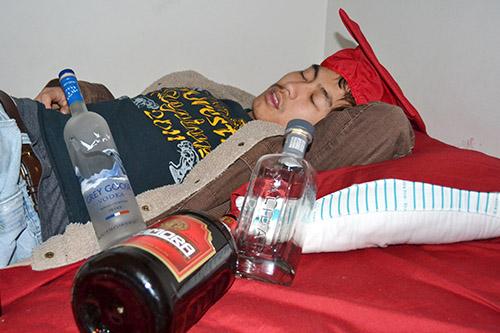 Authors of a new paper found that many students who drank heavily during their four years in college had “significantly lower” critical thinking skills upon graduating than those who didn’t binge drink. But that was true only for students who enrolled with already comparatively low critical thinking ability. " />
Authors of a new paper found that many students who drank heavily during their four years in college had “significantly lower” critical thinking skills upon graduating than those who didn’t binge drink. But that was true only for students who enrolled with already comparatively low critical thinking ability. " />
Victoria Crocker
Authors of a new paper found that many students who drank heavily during their four years in college had “significantly lower” critical thinking skills upon graduating than those who didn’t binge drink. But that was true only for students who enrolled with already comparatively low critical thinking ability.
Yet another study has found that alcohol isn’t good for college students’ critical-thinking skills, but this one has a twist: Binge drinking is only harmful if a student has low critical-thinking skills to begin with.
A new study from researchers at the University of Iowa found that binge drinking is harmful only to college students’ critical-thinking skills if these students already displayed low critical-thinking skills coming into college. The study’s sample included more than 4,100 students who attended college from 2006-10 at one of 17 institutions: 11 liberal arts colleges, three research universities and three regional universities.
The Centers for Disease Control and Prevention defines binge drinking as five drinks for males and four drinks for females in a course of two hours.
Although there is no specific research at N.C. State about the effects of binge drinking and critical thinking, Chris Austin, assistant director of health promotion at the student health center, said he wasn’t sure if binge drinking was only harmful to students at the University with low critical-thinking skills.
“I’ve known several students that did very well in high school and came on campus and started binge drinking and had their GPAs drop off significantly,” Austin said.
Austin said that there is a lot of research being conducted about alcohol and its effects on the brain because the brain is not fully developed until a person is about 25 years old. Therefore, someone who is a frequent drinker could alter his or her brain functions more permanently down the road.
Amir Rezvani, professor of psychiatry and behavioral science at Duke University, studies the effects of alcohol on the brain. According to Rezvani, the reason alcohol has such a profound effect on the brain is because alcohol goes everywhere water goes and the brain contains a high amount of water.
Critical thinking comes from the cortex and the prefrontal cortex, the “CEO” of the brain, and binge drinking impairs these areas’ ability to function properly, according to Rezvani.
The reason binge drinking is particularly harmful as opposed to drinking in lower quantities is due to the fact that when a person binge drinks, less time is allowed for the liver to process the alcohol, and it becomes more concentrated in the blood and brain, according to Rezvani.
Rezvani said he didn’t believe someone with lower critical-thinking skills would necessarily exhibit more damage from binge drinking than someone with higher critical thinking skills.
“Regardless of your capacity, if you drink enough, it will have an effect your critical thinking skills,” Rezvani said.
Rezvani said the effects of binge drinking depend on several factors, including drinking patterns, the length of the drinking period, the amount drunk and the frequency with which one drinks.
At N.C. State, it is mandatory that incoming students participate in AlcoholEdu, and, the program is accomplishing its goals Austin said.
Austin said the average alcohol awareness test score before completing AlcoholEdu is 55 percent. This score increases to 85 percent after the completion of the program, and Austin said he believes this shows that students become more knowledgeable after completing it.
Austin also said that the number of students calling for medical support due to alcohol-related issues has increased, perhaps due to more information about what to do if someone is showing signs of alcohol poisoning or other alcohol-related issues.
“Some people are looking for a magic bullet,” Austin said. “The purpose of this course is not to stop people from drinking, the purpose of this course is to have people reflect on their drinking behavior and if they are higher-risk drinkers, to consider being lower-risk drinkers.”
Austin said students who choose to drink should consider consuming less than the range of five drinks, spacing drinks out and looking at an alcohol chart or calculator to see what amount of alcohol would lead them to stay less than the buzz level or at a BAC of .055.